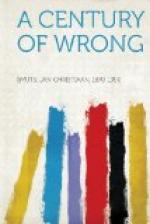“When the allegations were brought under the notice of this Government, they at once appointed a commission of enquiry, consisting of three members, namely, Landdrost Van der Berg, of Johannesburg, Mr. Andries Stockenstrom, barrister-at-law, of the Middle Temple, head of the Criminal Section of the State Attorney’s Department, and Mr. Van der Merwe, Mining Commissioner, of Johannesburg; gentlemen against whose ability and impartiality the Uitlander population of the Republic have never harboured the slightest suspicion, and with whose appointment the Acting British Agent also expressed his entire satisfaction. The instructions given to those officials were to thoroughly investigate the whole case, and to report the result to the Government; and they fulfilled these instructions by sitting for days at a time, carefully hearing and sifting the evidence of both sides. Every right-minded person readily acknowledges that far greater weight ought to be attached to the finding of this Commission than to the declarations of the complainants, who contradicted one another in nearly every particular, and who caused the whole enquiry to degenerate into a farce.”
“According to the report, nothing was proved as to the so-called illtreatment; the special instances of alleged illtreatment turned out to be purely imaginary; but it was clearly proved and found that the complainants had acted contrary to law, and the Commission only expressed disapproval of the fact that the arrests and the investigation had taken place at night, and without a proper warrant. It fills this Government with all the greater regret to observe that Her Majesty’s Government bases its charges on ex parte, groundless, and, in many respects, false declarations of complainants who have been set in motion by political hatred, and that it silently ignores the report of the Commission.”
[Sidenote: b. The Edgar Case.]
Mr. Chamberlain represented the Edgar case in the following way:—[45] “But perhaps the most striking recent instance of arbitrary action by officials, and of the support of such action by the Courts, is the well-known Edgar case. The effect of the verdict of the jury, warmly endorsed by the Judge, is that four policemen breaking into a man’s house at night without a warrant, on the mere statement of one person, which subsequently turned out to be untrue, that the man had committed a crime, are justified in killing him there and then because, according to their own account, he hits one of them with a stick. If this is justification, then almost any form of resistance to the police is justification for the immediate killing of the person resisting, who may be perfectly innocent of any offence. This would be an alarming doctrine anywhere. It is peculiarly alarming when applied to a city like Johannesburg, where a strong force of police armed with revolvers have to deal with a large alien unarmed population, whose language in many cases they do not




